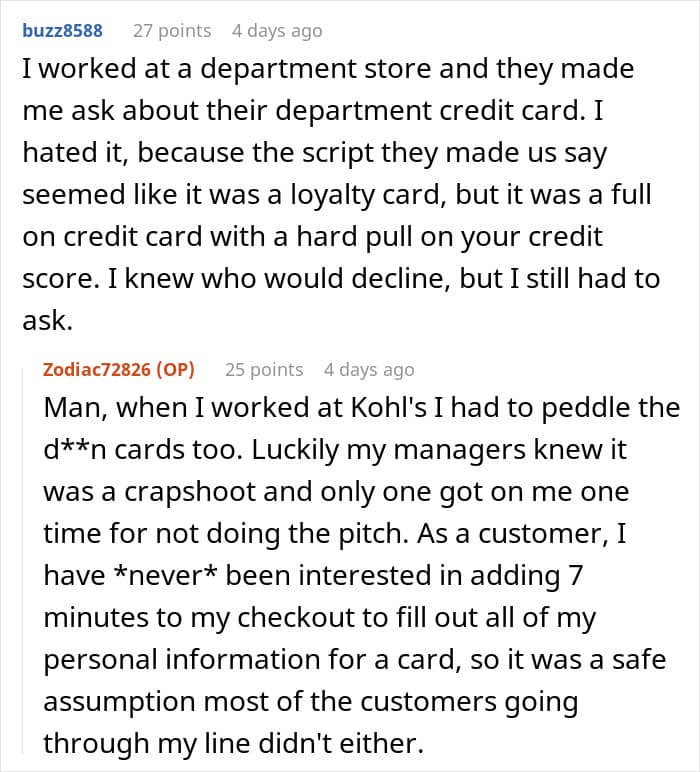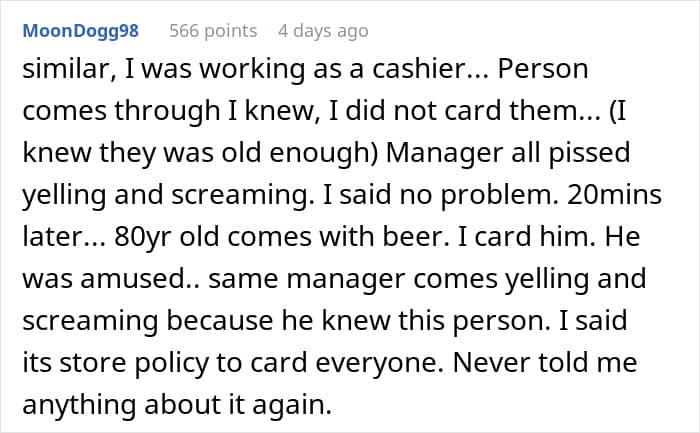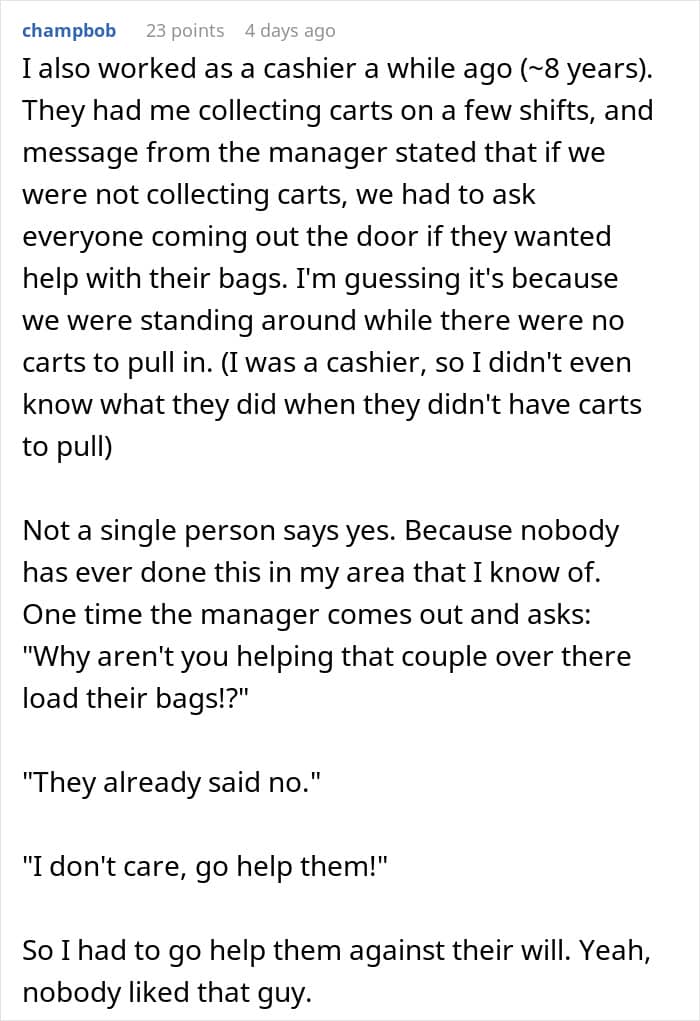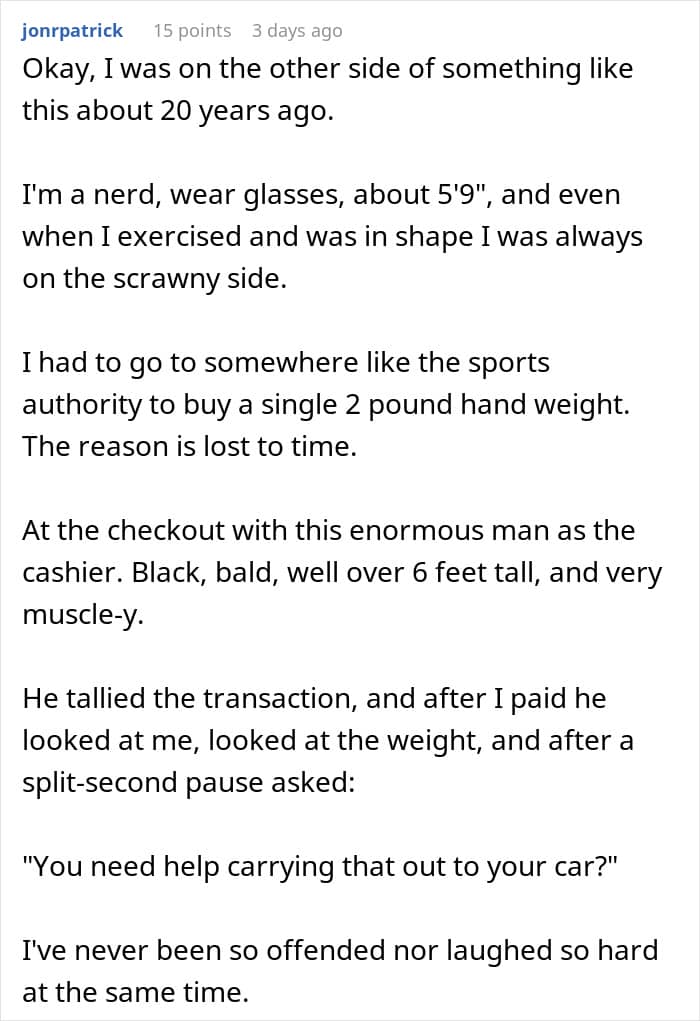Where you live can really shape what your grocery store experience looks like. Some places have the friendliest employees who’ll chat about your day, while others feel like everyone woke up on the wrong side of the cereal aisle. And then there are those stores where the staff are just doing their best to survive another shift, one odd encounter at a time.
A former high school bagger shared a funny story from one such job, where he discovered the underrated joy of malicious compliance. After being scolded for not offering to help a woman carry her one tiny bag, he decided to follow the rule exactly by asking a gym-loving person if he needed help with his single grocery bag. The confused look that followed was enough to make the manager rethink everything. Scroll on to see how the whole situation played out.
RELATED:
Every grocery store has its own set of rules and policies for how employees should interact with customers
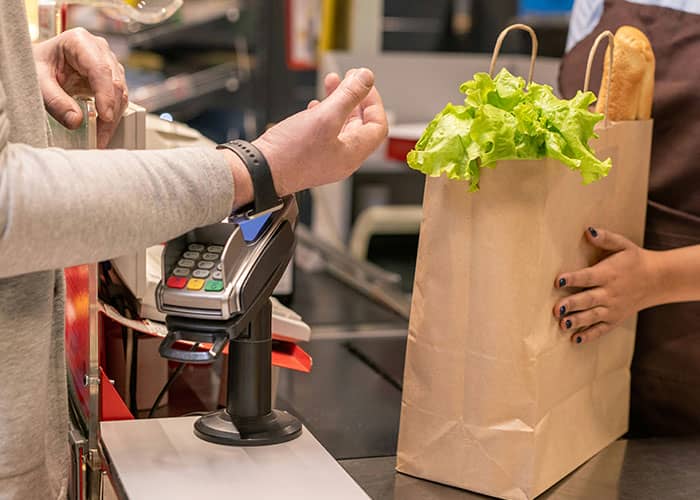
Image credits: Getty Images / unsplash (not the actual photo)
One person shared how they followed their manager’s instructions to the letter in a classic case of malicious compliance

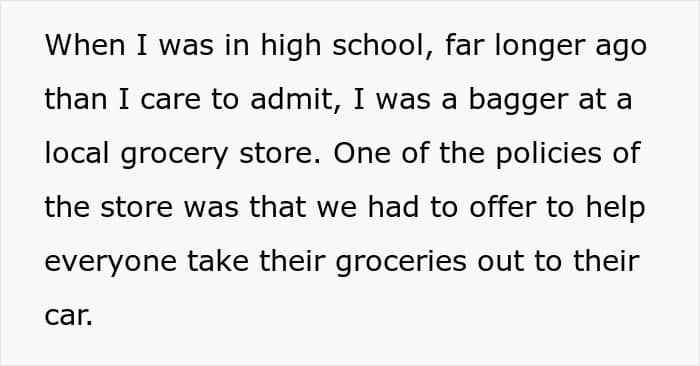



Image credits: Getty Images / unsplash (not the actual photo)

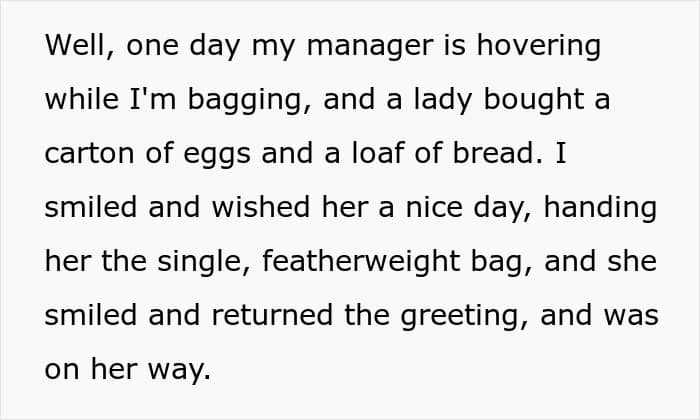


Image credits: Yunus Tuğ / unsplash (not the actual photo)



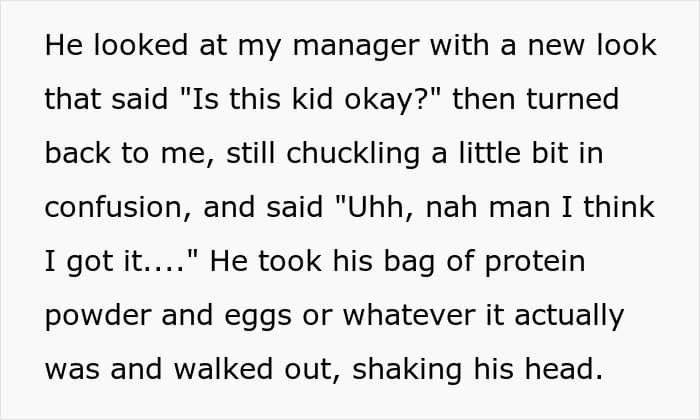

Image credits: Caleb Williams / unsplash (not the actual photo)


The author shared additional information about their workplace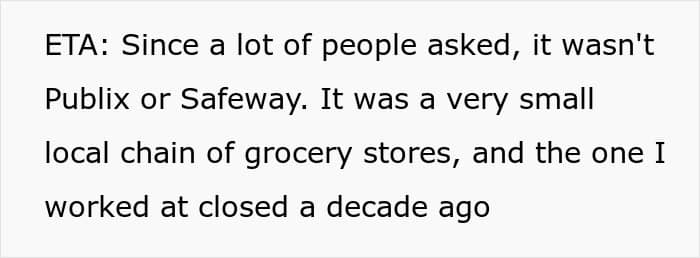
Image credits: Zodiac72826
Even though online deliveries are more popular than ever, a lot of people still prefer visiting grocery stores in person
Revenue in the grocery delivery market is projected to hit a jaw-dropping US$940.96 billion in 2025. That’s a whole lot of online checkouts and doorstep drop-offs! But even with the convenience of getting your groceries at home, many of us still find ourselves walking into a store every now and then. And let’s be real, those trips can be smooth or downright baffling. Sometimes, you’re greeted with a smile, and other times, you’re left wondering, “Did I do something wrong?” It turns out that a lot of that confusion has more to do with store rules than people’s moods.
To understand some of these everyday oddities better, we spoke with Dhwani Bhatt, a floor supervisor with experience at big supermarket chains in Mumbai. She’s seen it all, from awkward customer encounters to rules that make zero sense to shoppers. “People think we’re being standoffish or too robotic,” she says, “but often we’re just following protocol.” That protocol? It’s set by higher-ups sitting far away from the actual store floor. “It’s not that we don’t want to help, it’s that sometimes, we’re literally told not to.”
Dhwani stresses that what seems like someone’s personal behavior is often just a job requirement. “You see someone ignoring you in the snack aisle? It’s likely because they’re on task with no wiggle room.” For instance, someone might be stocking shelves or counting inventory with a strict deadline. “And if they don’t finish it, it’s their job on the line.” So next time an employee seems a bit zoned out, it might be because they’re just trying to stay employed. “We don’t mean to seem rude, we’re just trying to follow the rules.”
Take the placement of fruits and veggies, for example. “We’re not trying to confuse you or make you walk more,” Dhwani laughs. “There’s a layout plan we follow, and it’s all about product placement and flow.” Even if it feels counterintuitive, it’s often tied to how people shop or how stores want them to shop. “We know people want to grab tomatoes and onions quickly, but we can’t just move things around.” It’s marketing meets logistics, and employees don’t get a say in it. “We just execute what’s decided on paper.”
One thing that often catches shoppers off guard is employee behavior during sampling or demos. “A sample person has to stay at their designated station no matter what,” Dhwani says. So if you ask them where the green chilies are and they don’t help, it’s not because they’re ignoring you. “They’re just not allowed to leave their post; that’s someone else’s job.” Dhwani mentions that staff are often trained in silos with very specific responsibilities. “We really wish we could do more sometimes, but there are limits.”

Customers should try to cut store employees some slack, more often than not, they’re just following the rules set by someone higher up
“Then there are rules around not chatting or assisting while doing backroom work,” Dhwani explains. For example, someone doing inventory checks or cleaning floors isn’t supposed to engage with customers. “That’s another department’s duty,” she adds. Even if they want to help, doing so might mess up time tracking or lead to questions from supervisors. “Some rules make sense, others not so much, but they all exist for a reason.” The result? Sometimes staff look unfriendly when they’re just doing what they’re told.
A funny one, according to Dhwani, involves the bakery section. “Staff assigned to restocking bread can’t slice it for you unless it’s part of the shift plan.” She’s had customers storm off thinking it’s personal when, really, it’s a hygiene or manpower issue. “I once got scolded for helping slice a loaf outside of my assigned duty; imagine that!” The systems in place don’t always leave room for common sense or kindness. “We want to help, we really do, but sometimes the rules make it tricky.”
Another quirky rule? Store greeters and security can’t step away from the entrance to help. “Even if they see a lost child or someone drop their groceries, they’re instructed to stay put and call for help instead.” This can come off as cold or uncaring, but it’s meant to maintain structure. “It feels wrong, I know,” Dhwani says, “but it’s what the training tells us to do.” So, while you might expect a helping hand, they’re stuck at their post. “We just hope customers understand it’s not a personal slight.”
And then there are the cashiers, probably the most misunderstood of all. “We’re told to keep transactions fast and minimal. That’s why we can’t always chat or help beyond the register.” Cashiers are timed on their transactions, and slower performance means warnings. Even customer-friendly gestures like helping bags or double-checking items can be frowned upon. “We’re always walking a line between helpful and too slow.”
Baggers are often seen as too chatty or too silent, and it’s rarely their choice. “We’re given scripts,” Dhwani explains, “and sometimes even the speed we pack things is tracked.” They can’t leave their area, can’t skip the offer to help carry bags, and often face penalties if they don’t follow exact steps. “It’s all about efficiency metrics, even for something as simple as bagging pasta and tomatoes.” So when someone offers help with a single carton of eggs, they might just be following orders. “We laugh about it later too.”
In this particular case, the store manager seemed a little too eager to enforce the rule. The OP just followed instructions to the letter and it ended up being hilarious. It’s a classic case of malicious compliance: follow the rules, no matter how silly they seem. And sometimes, that’s the only way to prove a point. Don’t you think a little flexibility could go a long way in places like these?

Many people online felt the author’s manager could have shown more flexibility in handling the situation



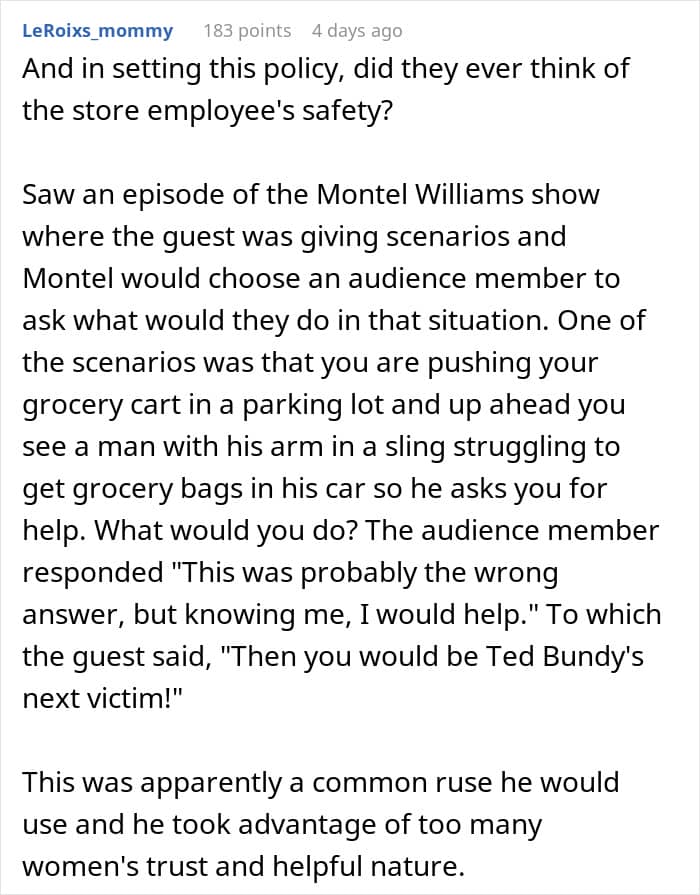







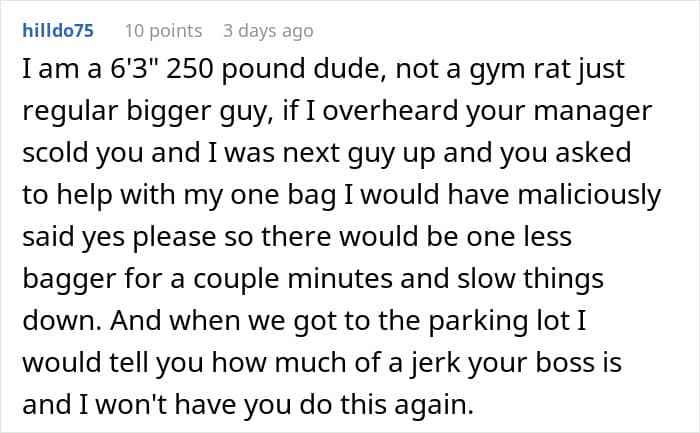

Others chimed in with their own similar experiences

